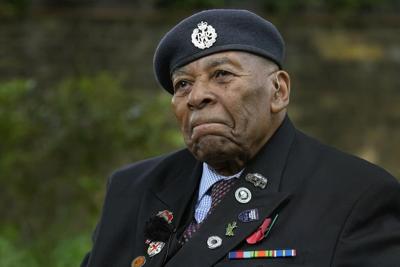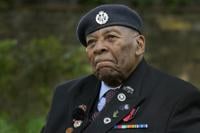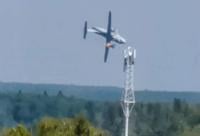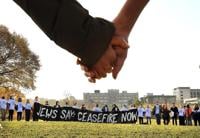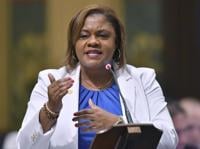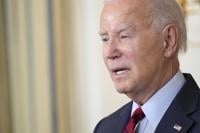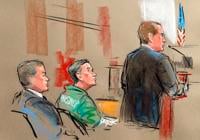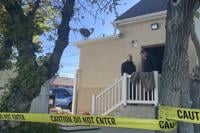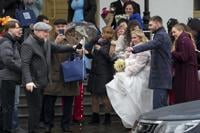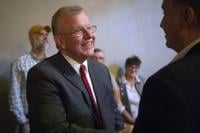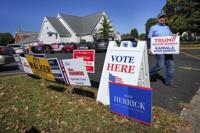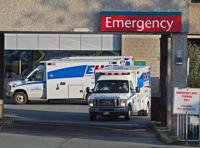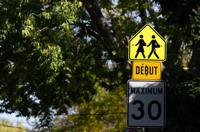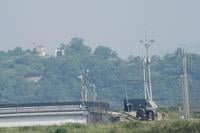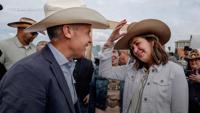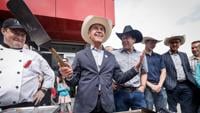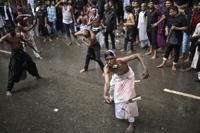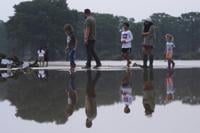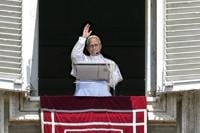LONDON (AP) — Gilbert Clarke leans back on the seat of his mobility scooter, cranes his neck and gazes into the bright blue skies over East London, remembering the moment 80 years ago when he knew the invasion of France was under way.
Clarke, then an 18-year-old volunteer from Jamaica, was still a trainee learning about the intricacies of radar systems when the roar of aircraft engines forced him to look to the heavens on June 6, 1944.
“You couldn’t have seen the blue sky,” Clarke recalled, his voice tinged with awe eight decades later. “Was all planes. Hundreds and thousands of them — all shapes and sizes. All different type of plane. The instructor (said) ‘Hmm. Well, boys, it’s started.’’’
“We all shouted, `Give them hell,’ or probably something a lot stronger than that.’’
Clarke got to make his own contribution after he finished his training a few weeks later and was posted to a series of air bases where he serviced the radio and radar systems of British and American aircraft for the rest of the war. He plans to travel to northern France later this wee k, joining other veterans of the Battle of Normandy marking the that started the campaign to liberate Europe from Nazi rule.
Clarke, now 98, is one of more than 3 million men and women from South Asia, Africa and the Caribbean who served in the British military during World War II. Citizens of what was still the British Empire, they volunteered to fight for “king and country” just like recruits from the British Isles, but their service is often overlooked.
The U.K.’s former colonies were crucial to the Allied victory because they supplied money and resources, as well as manpower, to support the war effort after the Nazis occupied Europe and threatened to invade Britain, said George Hay, a historian for the Commonwealth War Graves Commission. Those contributions should be remembered along with the sacrifices of those who fought and died on the Normandy beaches, he said.
“It’s incredibly important, what those men managed to do on the beaches on that one day,” Hay said. “But what gets them there and what keeps them there and what allows them to fight on from that point is far bigger than those who actually put their feet on the sand.”
That includes ground crew members like Clarke, who had the unglamorous but vital job of maintaining the aircraft that were crucial to the success of the Normandy campaign.
The RAF was a popular destination for Black volunteers because the air force lifted the “color bar” soon after war broke out and it started recruiting in the Caribbean in 1940. By the end of the war, around 6,000 West Indian men had enlisted in the RAF, with 450 assigned to air crews and another 5,500 serving on the ground. Eighty women joined the Women’s Auxiliary Air Force.
Many of the recruits faced racism, despite an official ban on discrimination. Still, many thrived.
One of the most highly decorated West Indian volunteers was navigator Philip Louis Ulric Cross, a native of Trinidad and Tobago who flew 80 missions over Germany and occupied Europe. Cross, who died in 2013, was awarded the Distinguished Flying Cross and was promoted to squadron leader before he left the RAF. He later served as a high court judge in Trinidad and returned to London as the high commissioner for Trinidad and Tobago in 1990.
Clarke was a teenager in Montego Bay when he heard reports of German submarines attacking ships in the Caribbean and figured the war was coming to Jamaica. Rather than wait for that to happen, he decided to enlist.
“We were all in a situation where someone’s gotta do something to end what was going on,” Clarke said, speaking softly, with a Jamaican lilt still in his voice. “And (I’m) proud to know I did my little bit.”
Still, there was a “flood of tears” when Clarke went home to say goodbye. He soon found himself on board a troop ship that was part of a convoy being attacked by U-boats, but he made it safely to Liverpool and was assigned to a base in northern England for training.
Life in the RAF proved to be a series of Nissen huts, prefabricated structures made of corrugated iron bent over a semi-circular frame and heated with a single wood- or coal-burning stove.
“The Black volunteers had learned a lot about Britain at school and most considered that they were in a real sense ‘coming home’ to the mother country,” according to an exhibit at the RAF Museum. “On arriving here, however, many experienced culture shock” due to the cold weather, lack of Caribbean food and the fact that most white Britons had never met a Black person.
Even so, Clarke decided to stay in England after the war, using his RAF training to earn a living “fixing anything with a wire.”
Like other veterans, he proudly wears his RAF beret and a dark suit coat festooned with medals and military badges on ceremonial occasions. But in Clarke’s case, the ornamentation isn’t just to celebrate his service. It also reminds the world that men who look like him came to Britain’s aid in its hour of need.
While he sidesteps questions about any racism he may have faced over the years, Clarke recognizes that Black people still face discrimination in Britain.
He hopes his story, and those of other Black veterans, will help to change that.
“We are somebody,″ he said. “We did something for the presence of all the people here. I feel very proud.”

